People that travel even somewhat frequently are no stranger to hotel and airline reward programs. Nor should they be – if you’re on the road more than a few times a year, the benefits of these loyalty programs become obvious almost immediately. The ubiquitous frequent flyer programs are arguably the most well-known form of loyalty rewards and have been in existence since the 70s, and the big hotel chains (Hyatt, Hilton, and Marriott, just to name a few) have been doling out kickbacks to their regular visitors for decades as well.
But due to the inherently similar nature of airlines and hotels and the services they offer to customers, those kickbacks that are doled out are also bound to be exceedingly similar. Fly a bunch with us? Have a free flight. Stay a bunch with us? Have a free night. There are indeed several smaller differences among airline and hotel reward programs (which we’ll get into later in the article), but given that most aspects are the same among the competition, what drives customers to choose one airline or hotel chain’s reward program over another?
Why customers might choose one loyalty program over one that’s similar
1. How close are you to your customers?
A major factor in which airline and/or hotel reward program a customer will consider is the proximity to the company’s hub, or main sphere of influence. For example, Southwest Airlines has grown into a titan in the airline industry and is currently the world’s largest low-cost airline. A big reason for its growth is the price, speed, and efficiency in which they carry out their numerous daily routes. However, as they originated in Dallas, a majority of their focus cities are indeed in the south west region of the United States. Although they have expanded considerably over the past few years, a regular business traveler in New York City that does a lot of smaller, regional flights will probably look to one of the East Coast based airlines for a majority of his or her flights, such as JetBlue. And if you need to jump on an international flight, Southwest will not be able to accommodate you.
2. Do customers visit you because of family or friend recommendation?
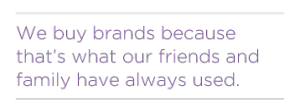 Another reason a customer might choose a reward program is completely out of the control of the airline or hotel, or any business for that matter – inherited brand loyalty. “So what is brand inheritance?” asks Thunder Tech marketing expert Thea Letteri. “It’s when you and I inherit brands from our loved ones without question or concern.
Another reason a customer might choose a reward program is completely out of the control of the airline or hotel, or any business for that matter – inherited brand loyalty. “So what is brand inheritance?” asks Thunder Tech marketing expert Thea Letteri. “It’s when you and I inherit brands from our loved ones without question or concern.
“They influence our shopping habits long after we stop living with our families, begin shopping for ourselves or start living with someone as a couple. We simply buy the brands because that is what our friends and family have always used. We trust their opinions, we think they’re cool, we’re comfortable with those brands and we really don’t have a good reason to make a change.” If you grew up travelling with your parents, who regularly flew United and always stayed at Howard Johnson hotels, odds are good that you’ll continue those patterns as you travel on your own or with your family.
Make it easy to earn your rewards and use them
While predominately similar, there are enough small differences among the most popular frequent flyer and hotel reward programs to make them more or less appealing to potential customers. The largest and most important differentiators for frequent flyer programs are 1) how frequent one can accumulate free miles, and 2) how easy it is to redeem said miles. For the past four years, the consulting organization called IdeaWorksCompany has conducted a study that ranks the major airlines, both internationally and domestically, with these two factors in mind.
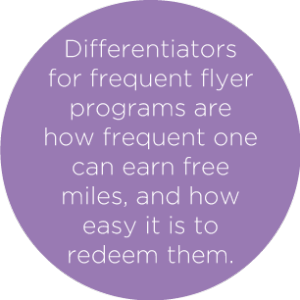 Small perks don’t drive as many frequent purchases as earning worthwhile rewards…
Small perks don’t drive as many frequent purchases as earning worthwhile rewards…
The best frequent flyer programs in 2013 according to IdeaWorksCompany were Southwest’s Rapid Rewards program for domestic flights, and both GOL Airlines’ SMILES program and Air Berlin’s Topbonus program, which tied for first place internationally. A trend noted in the past few years has been the rise of low-cost, value airlines and their frequent flyer programs, such as Rapid Rewards.
A big reason for this shift is that value airlines such as Southwest tend to place the highest focus on the actual redemption of free miles and trips, and much less focus on some of the other frequent flyer program perks. For example, many frequent fliers enjoy the occasional complimentary upgrade to first class – Southwest planes are not physically configured for first class and do not offer it for any of their flights.
… but the perks can be a deciding factor for the super VIP customers
But those other perks can be a deciding factor for the big-time road warriors – free upgrades, access to boarding clubs and lounges, early boarding, priority re-booking, top placement on standby lists, and extra bonus miles in addition to those already being earned – can be all the difference in top-flight customers selecting their program of choice. The last-ranked domestic airline in the IdeaWorksCompany study was Delta Airlines, which suffers from not only being notoriously difficult to redeem free flights, but also from holding back many of their other perks to their members. It happens frequently enough that many have become fed up enough to jump the ship completely and switch carriers.
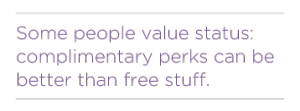 When selecting a frequent flyer program, it’s important to evaluate not only the most important, “meat and potatoes” aspect of how often you accumulate miles, how many flights are offered on your most travelled routes, and how easy it is to redeem them, but also pay special consideration to the other perks they throw your way.
When selecting a frequent flyer program, it’s important to evaluate not only the most important, “meat and potatoes” aspect of how often you accumulate miles, how many flights are offered on your most travelled routes, and how easy it is to redeem them, but also pay special consideration to the other perks they throw your way.
Some travelers value the status of some of the complimentary perks more so than the free flights themselves. “For many travelers, status is far more important than miles,” says Scott McCartney of the Wall Street Journal. “Redeeming miles can be difficult and expensive, frustrating frequent fliers. The true benefits of frequent-flier loyalty are the upgrades, access to airport clubs, priority security and boarding lines, waivers on fees for baggage, special phone lines to airline agents and being at the top of standby and rebooking lists.” A bit of research will go a long way – airlines freely post their reward programs and tiers on their websites, and online forums and message board communities such as www.flyertalk.com allow end users to share their experiences (and headaches) in dealing with frequent flyer programs from nearly every carrier imaginable.
Hotel loyalty programs base perks and rewards on customers habits
Hotel loyalty programs share a lot of similarities between frequent flyer programs – the primary, “meat and potatoes” reward with hotel programs is going to be earning those free nights. But frequent guests who find themselves in a particular chain quite regularly will also be treated to bonus perks – free upgrades to deluxe rooms and suites, complimentary valet parking, and discounted or free food and drinks at the hotel restaurant. And just like with flying, some people may place more value on the bonus perks than the free nights.
As far as free nights go, the loyalty blog www.loyaltylobby.com crunched the numbers to find which out of the following major six hotel chains – Hyatt, Marriott, Hilton, Club Carlson, Starwood, and InterContinental Hotels Group (IHG) – offered free nights the quickest. Comparing both the top-tier packages and rooms and mid-tier ones, they found that Club Carlson (with its Radisson, Park Plaza, Park Inn and Country Inn and Suites chains) were far and away the winners, requiring the least amount of dollars spent to earn a free night. Hilton, IHG, Hyatt, and Marriott were close to each other in the middle depending on the tier of the room package and method of payment, but Starwood was consistently ranked last and required customers to spend the most before earning a free night.
As for the other perks, follow the same strategy as with airlines – check the reward program webpages and call the hotel chain to see what additional bonuses can be yours. Paint them an accurate picture of your travel habits and what matters most to you when staying in a hotel and you’ll soon be able to find the program that fits you best.
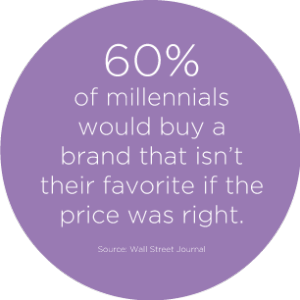 Are your customers bargain hunters or loyal to your brand?
Are your customers bargain hunters or loyal to your brand?
While many people are fiercely loyal to airlines, hotel chains, and many other brands in their personal lives, some think that the current generation of 20 to 30-somethings that have grown up in the internet age are less capable of brand loyalty. Why would the generation that knows how to hunt for bargains and share those bargains with the world at the click of a mouse stick with a brand when they know they could get a better deal elsewhere?
In early 2013, Ernst and Young released a study about brand loyalty that showed some telling statistics. Only 40% of those worldwide said brand loyalty was a factor in making a purchasing choice, but just 25% do in the US, which reflected a significant decrease from the year prior. In addition, a 2012 Wall Street Journal report indicated that 80% of millennials valued the lowest price as the most important factor and 60% would buy a brand that isn’t their favorite if the price was right. It’s becoming so common that nearly all airlines offer status matching, meaning you can take your top-level status and free miles from a competitor and transfer them to a new airline – if you like what you get and travel the required amount for your first 90 days, the elite status in the new frequent flyer program is yours.
Key takeaways
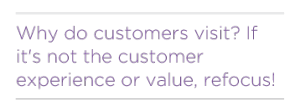 When it comes to loyalty programs, airlines and hotels have been in the game for quite a while. So we can learn quite a few things from their experiences and how they each differentiate between each other.
When it comes to loyalty programs, airlines and hotels have been in the game for quite a while. So we can learn quite a few things from their experiences and how they each differentiate between each other.
Be aware of why customers visit your local business. If it’s something other than the customer experience and value (the quality lines up with the cost) you offer, it’s time to refocus! Starting a rewards program of your own can be a step in the right direction to begin delighting your customers who visit you. To increase foot traffic or the frequency of purchases, like Southwest Airlines Rapid Rewards, make it fast and easy to earn the good stuff, the things your customers visit you for already, instead of earning upgrades or special treatment over long periods of time. And even though the economy has caused an increase of bargain hunters, let that work in your favor by offering the bargains or freebies to only the customers who visit you the most, through a well structured digital rewards program obviously! That will keep your current customers coming back again and again, and turn those casual customers into loyal customers instead.

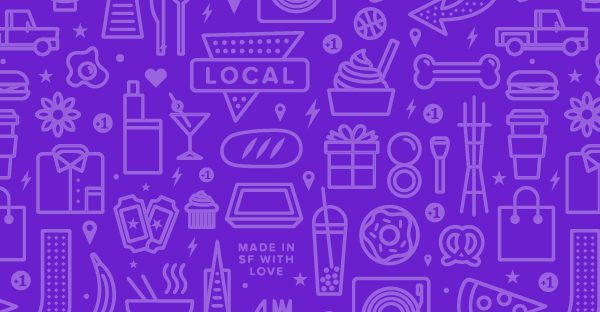





Leave a Comment